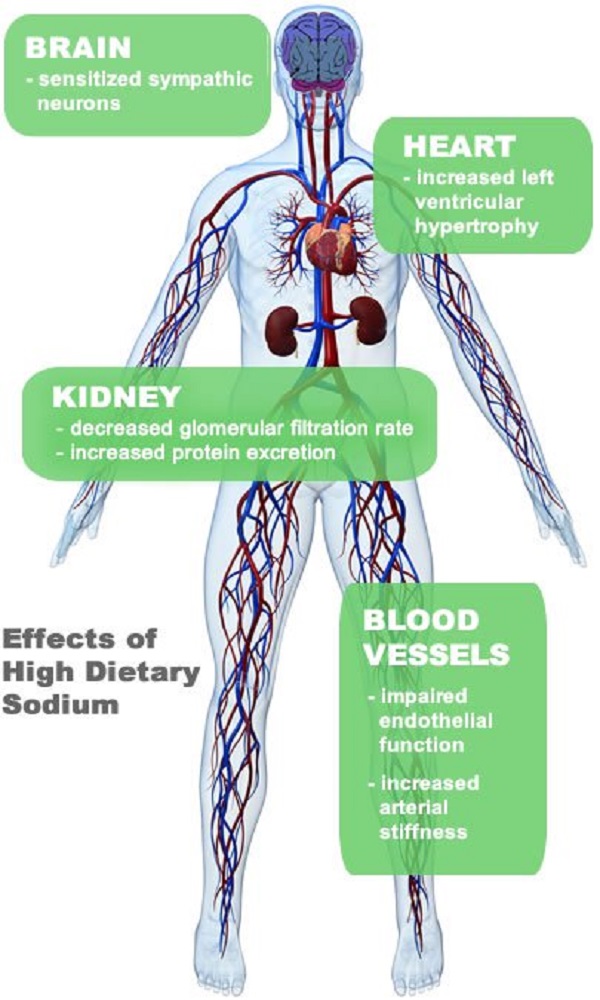What are the dangers of salt? Most of us know that a salt-rich diet can raise blood pressure, which can raise our risk of heart attacks, strokes, and other woes.
But for some people, a high salt intake does not lead to high blood pressure, or hypertension. These would be the lucky ones if hypertension were the only negative result of eating a high salt diet. It’s not. The dangers of salt include hypertension, heart disease and kidney problems.

There are many people who think. That's not true, asserts research. The dangers of salt go well beyond high blood pressure. Salt is a mixture of 40% sodium and 60% chloride, or sodium-chloride. It is from salt that we get most of the sodium in our diet.
Dangers of Salt | Blood Vessels
Elevated sodium levels can negatively affect the function of the inner lining of the blood vessels, called the endothelium, and the last thing we want to do is foul up our endothelium. The endothelium introduces all kinds of chemicals, like nitric oxide, which control how well our blood vessels expand and contract. Put simply, we want blood vessels with good elasticity; without it, they can’t stretch well with each pulse. They stiffen, making it harder for the heart to pump blood throughout the body. Eventually, the heart wears out. It’s called heart failure.
One of the endothelium’s other key jobs is releasing factors that cut down on platelet stickiness, which helps ensure that our red blood cells flow smoothly, like traffic on an unclogged freeway. When the endothelium is malfunctioning, the result of too much salt as well as other lifestyle-related factors like high insulin levels, high LDL (bad) cholesterol, and high blood glucose, it becomes a breeding ground for inflammation, cholesterol plaque build-up, and cardiovascular diseases.
Dangers of Salt | Heart
High blood pressure is a major risk factor for left ventricular hypertrophy, which is enlargement of the muscle tissue that makes up the wall of the heart’s main pumping chamber. But research has found that high sodium intake may increase left ventricular wall thickness independent of high blood pressure. For example, in a study of healthy adults with normal blood pressure or minimal hypertension, those with the highest sodium excretion had significantly greater diagnoses of left ventricular hypertrophy.
Having left ventricular hypertrophy can lead to multiple heart-related problems, including arrhythmia (abnormal heart rhythm), heart attack, sudden cardiac arrest (sudden loss of heart function), and heart failure (inability of the heart to pump enough blood throughout the body).
Dangers of Salt | Kidneys
One of the ways doctors assess how well our kidneys are working is with a test called glomerular filtration rate. Glomeruli are tiny sieves in the kidneys that filter waste from the blood. The higher our glomerular filtration rate, the better our kidneys are at getting rid of waste.
Studies have found that a high salt intake, even with only a minimal rise in blood pressure, can lead to decreased rates of glomerular filtration, which are a sign of chronic kidney disease, and, if not checked, kidney failure. High sodium intake also means increased protein excretion by the kidneys, which can lead to heart and kidney disease.
Dangers of Salt | Brain
Still further, the authors of the newly published review in the Journal of the American College of Cardiology point out that a high salt intake may negatively affect the brain. Eating excess salt causes the sympathetic nervous system to over-react to stressful situations, pumping out chronically high levels of stress hormones.
Increased blood pressure variability means we’re prone to having short-term spikes in blood pressure, which physicians had traditionally thought were benign as long as overall blood pressure were normal. But more and more, science is finding that increased blood pressure variability, in and of itself, is associated with an increased risk of cardiovascular events and death.
The Dangers of Salt | Bottom Line
It’s actually a win-win: Your meals are a joy without added salt, and your body is healthier, too.
We now have many reasons beyond high blood pressure to maintain a sodium intake of no more than 1,500 mg daily. The solution appears clear and simple: stop adding salt to food. Bottom Line: you give up salt, but what you gain is so much more. With lifestyle changes, you may be able to maintain healthy blood pressure without the use of medication. Talk to your doctor about monitoring your blood pressure regularly to lower your risk of heart attack and stroke. For more information on medical services at CIH, please call:
- Operator: (8428) 6280 3333, ext. 8035 or 8036
- Address: No. 3, 17A Street, Binh Tri Dong B Ward, Binh Tan Dist. (Next to AEON Mall Binh Tan). Ho Chi Minh City.
- Website: https://cih.com.vn/en/
- Email: This email address is being protected from spambots. You need JavaScript enabled to view it.










